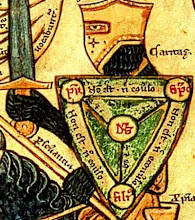I agree with the Iglesia ni Cristo (INC) that the
“apostles… unequivocally taught that Christ is man.”[1] I also believe in His full humanity.
To deny Jesus’ true humanity was to deny something at the very heart of Christianity, so that no one who denied that Jesus had come in the flesh was sent from God.[2]
But
I disagree with the conclusion of the INC that
Christ’s being a
man proves that He is not God. And the apostles were unanimous in this regard.
… He is different from God. He is not God, neither is He God-Man.[3]
Yes, as far as the
perfect humanity of Christ, “the apostles were unanimous”. But, the fact that
He is man does not prove that He is not equal with God. To affirm is one thing.
To deny is another. (See “Did Jesus Deny His Deity in John 8:40?”)[4] Yet, the INC insists that this is not so.
Christ was conceived
by His mother, Mary. This means He is man and not God. For the true God could
never be conceived by any human mother as He is neither a man nor a son of man
(cf. Num. 23:19).[5]
Of course, “the true God
could never be conceived by any human mother”. Mary only conceived His
humanity. We never claimed that deity could be conceived. So, it is actually
irrelevant to raise that point. It is interesting that the INC quoted Numbers
23:19 to buttress their belief.
God is not man, that he should lie, or a son of man, that he should change his mind. Has he
said, and will he not do it? Or has he spoken, and will he not fulfill it?[6]
But Numbers 23:19 does not actually rule out that God would become man. The verse was not even talking
about the impossibility of God taking on flesh, that is, the nature of man in
addition to His nature as God. It was about His immutability regarding His
promises and His purposes.
In our passage, the
prophet Balaam was giving his second oracle. King Balak of Moab hired him to
curse the nation Israel. But, through this prophecy, Balaam declared
God does not
change His ultimate purposes or go back on His solemn promises. He does, of
course, respond to the words and actions of people by adjusting His plans. It
is from God’s larger purposes that He does not “repent” [or “change His mind”]
(v. 19). The point is that God is not fickle. No one can induce Him to curse
those whom He has chosen to bless.[7]
God is not man in the
sense that He does not lie and that He does not change His mind. God is not
like man in that regard. But Numbers 23:19 does not deny that God would become man. Scripture tell us that God did become man.
In the beginning was the Word, and the Word was with God, and the Word was God. ... And the Word became flesh and dwelt among us,...[8]
Someone said, “If
the plain sense of the text makes sense, seek no other sense for it will be
nonsense.” The plain sense of Numbers 23:19 is that God is unchanging. To
say that the verse denies that God would become man is seeking no other sense but nonsense.
© 2012 Bible Exposé Apologetics Ministry. To know more about us, click here.
________________________________
[1] Ruben D. Aromin, “Just when was Christ made God?” Pasugo: God’s Message, July 1994, 12.
[2] Wayne Grudem, Systematic Theology (MI: Zondervan, 1994), 540.
[3] Aromin, 12.
[5] Aromin, 12.
[6] All Bible verses are from the English Standard Version. Emphasis added.
[7] Dr. Thomas L. Constable, “Notes on Numbers 2012 Edition,” Sonic Light, 2012, http://soniclight.org/constable/notes/pdf/numbers.pdf (accessed 31 August 2012).
[8] John 1:1, 14a. Emphasis added.


<< Home